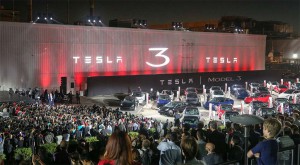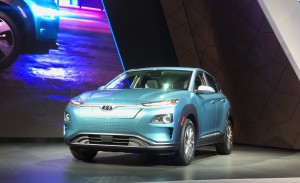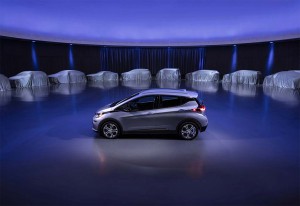Automakers are investing tens of billions of dollars gearing up to produce a new generation of plug-based vehicles, a worrisome effort considering that all electrified vehicles – from mild hybrids to pure battery-electric vehicles – accounted for just 3% of the overall American market last year.
But a new study finds that a full 20% of U.S. motorists want their next car, truck or crossover to be electric, according to the AAA. That’s up from 15% in just a year, the travel service reports and, perhaps not so coincidentally, the increase comes at a time when manufacturers are beginning to roll out an assortment of new models that offer longer range and quicker charging at a lower cost.
“Today, electric vehicles have mainstream appeal,” said Greg Brannon, AAA’s director of Automotive Engineering. “While concern for the environment is still a major motivator, AAA found U.S. drivers are also attracted to the lower long-term costs and advanced technology features that many of these vehicles offer.”
In particular, Bannon said, range anxiety is becoming less of a concern as more long-range models come out, many of them targeting relatively mainstream price segments. That includes the Tesla Model 3, Chevrolet Bolt EV and Hyundai Kona EV, all delivering over 200 miles per charge.
That said, 58% of those surveyed by AAA still said the possibility of running out of power while traveling will keep them from buying an all-electric model – though that figure is down from 68% when the organization first started asking about electric vehicles in 2017.
(EPA and automakers come under fire as feds get ready to roll back mileage standards. Click Here for more.)
The first significant pure battery-electric vehicles, or BEVs, came to market in the 1990s when California briefly tried to mandate a market. They were quickly pulled from showrooms due to concerns about cost, range and lack of features. Today’s new plug-based models are improving on all fronts, proponents say. And they’re offering more options to buyers.
“Today, there are 42 models of electric vehicles on sale, including 15 battery electric, 24 plug-in hybrid electric and 3 fuel cell electric models, with more in development,” Mitch Bainwol, head of the trade group, the Alliance of Automobile Manufacturers, was set to testify before Congress today. “Consumers can now buy EVs of all different shapes and sizes — small cars, large cars, SUVs and minivans, in 2WD or AWD, with shorter and longer ranges, from economy vehicles to luxury models and everything in between,” Bainwol said in an advance copy of his opening statement.
Those figures don’t include the scores of micro and conventional hybrids that have also come to market, the Toyota Prius being the most well-known of the offerings.
Sales of all-electric models rose 24% in 2017 but, as Bainwol also plans to report to Congress, plug-based models accounted for barely 1% of U.S. new vehicle sales – about 104,000 last year. Add in those hybrids and the total still lags at barely 3 percent.
The question is whether those potential customers who say they want to own an electric will actually follow through.
The good news is that there will soon be even more options. According to one recent study, more than 100 plug-based models will be available in U.S. showrooms by 2021. That includes at least two more from General Motors due out by the middle of next year, an array of offerings from Volkswagen that will be sold through the new VW I.D. sub-brand and even luxury electrics from the likes of Jaguar and Aston Martin.
(Click Here for a first look at the production version of the new Kia Niro EV.)
Tesla will also launch the Model Y, an SUV counterpoint to the new Model 3 sedan that currently has about 400,000 potential buyers on an advance reservation list waiting for the company to resolve manufacturing problems at its Fremont, California assembly plant.
Longer range is just one of the factors that American motorists are weighing as they look at the new BEV options. Cost is another. The Tesla Model 3, Chevrolet Bolt EV and second-generation – and longer-range – Nissan Leaf all come in at or under $30,000 for base models after factoring in federal tax credits. But those credits will soon go away for some brands whose sales exceed a mandated sales cap. And once options are added in, prices can soar. Tesla isn’t even building base Model 3 sedans right now, so early buyers are routinely spending as much as $50,000.
Then there’s the issue of charging. According to the AAA, 68% of those surveyed this year want to be able to plug in and go within 30 minutes. In reality, most owners are expected to do the majority of their charging overnight at home, but new Level 3 high-speed chargers are popping up across the country and can deliver up to about 80% of battery capacity in anywhere from 15 to 30 minutes. Electrify America, a project funded by VW as part of the settlement over its diesel emissions scandal, will soon launch even more advanced charging systems that could deliver the equivalent of 20 miles of range per minute.
(Click Here for more on Electrify America’s plans to roll out super-fast chargers across the country.)
If the results of the latest AAA EV study proves accurate, sales of electric cars would jump into the millions each year, considering about 17 million vehicles of all forms are expected to be sold in 2018. Even if a third of those who said they want an electric actually follow through, sales would jump to more than 1 million annually – a figure that bodes well for all the new plug-based models heading to market.




